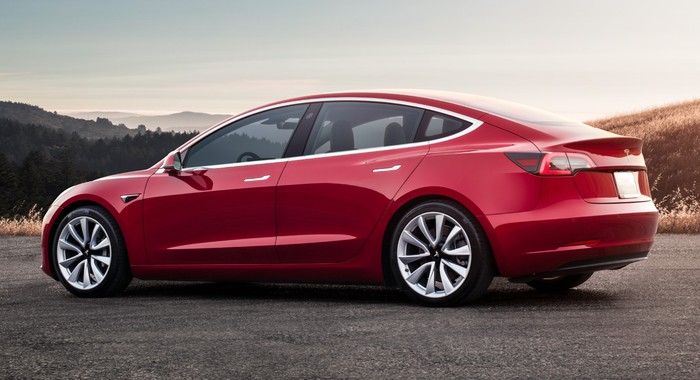
Tesla, Consumer Reports spar over Model 3 stopping distance
CR declined to recommend the Model 3, claiming it took 7 feet longer than an F-150 to stop from 60 mph, among other \"big flaws.\"
The Tesla Model 3 has not been entirely well received by the Consumer Reports test team, receiving praise for some features but prompting a dispute over the car's stopping distance.
"The Tesla's stopping distance of 152 feet from 60 mph was far worse than any contemporary car we've tested and about 7 feet longer than the stopping distance of a Ford F-150 full-sized pickup," CR wrote in a recent report.
Tesla's own internal tests claim to have achieved an average stopping distance of 133 feet, using the same tires that were outfitted to CR's test vehicle.
"The automaker noted that stopping-distance results are affected by variables such as road surface, weather conditions, tire temperature, brake conditioning, outside temperature, and past driving behavior that may have affected the brake system," the report adds.
CR clarifies that it uses the SAE standard procedure of driving the car at 60 mph and then slamming on the brakes until the car comes to a stop. The test is repeated multiple times to ensure consistency, while the car is driven approximately a mile between tests to make sure the brakes don't overheat.
"Before each test, we make sure the brake pads and tires have been properly conditioned," says CR auto testing director Jake Fisher. "We've conducted it on more than 500 vehicles, and we are always looking for consistent, repeatable results."
Notably, the first Model 3 stop in the test series achieved a distance of around 130 feet, consistent with Tesla's findings. All subsequent tests were longer, however, even after the brakes were allowed to cool overnight.
The magazine even obtained a second Model 3 from a private owner to double-check its findings. After repeating the same tests, "we got almost identical results." Car and Driver also experienced inconsistency, noting vibration and one test from 70 mph that took an 'interminable' 196 feet.
"I've been testing cars for 11 years, and in 11 years, no car has stood out with inconsistent braking like this," C&D testing director KC Colwell told Consumer Reports. "Some trucks have ... It was just weird."
A Tesla spokesperson hinted at the company's ability to release over-the-air updates to address certain issues, including stopping distance. Such updates would presumably focus on software that controls the anti-lock braking system. Modern ABS controllers must be finely tuned to manage wheel slip without unnecessarily brake pressure reduction.
Despite the complaints about stopping distance and "stiff ride," CR praised the Model 3's performance and Porsche 917 Boxster-like handling. It also set a range record of 350 miles on a single charge, the longest distance the magazine has also experienced in an electric vehicle.